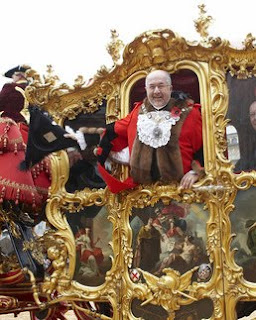Lord Turner versus the Lord Mayor of London
 The Right Honourable Lord Mayor of London, not to be confused with the Mayor of London, has been sounding off:
The Right Honourable Lord Mayor of London, not to be confused with the Mayor of London, has been sounding off:“It is banking activity, international banking activity, which makes the world go round,” the lord mayor said, as he cautioned that regulatory changes “must be designed to strengthen and help grow the financial services sector, not to first paralyse and then shrink it”.
Everyone now knows that the City of London is too big, too powerful, and too dangerous. It is a tax haven in its own right, and the centre of a network of tax havens around the world. The Lord Mayor, who is head of the City of London Corporation (a very curious beast ) is currently Ian Luder (pictured), who has made some very crass statements in the past about protecting London's offshore status, such as:
"The Government has learned not to kill the Golden Goose although it leers at it from time to time. . . . Tax exemption for foreign dividends is very good news, as is simplified asset management taxation and stamp duty land tax relief for alternative finance investment bonds."
Luder's latest words were uttered at a banquet in the City which was also addressed by the very brave Lord Turner, head of the City regulator, who has attracted withering fire for noting the "socially useless" aspect of much of what banks do. Turner said yesterday:
“The financial industry, more than any other sector of the economy, has an ability to generate unnecessary demand for its own services – that more trading and more financial innovation can under some circumstances create harmful volatility against which customers have to hedge, creating more demand for trading liquidity and innovative products; that parts of the financial services industry have a unique ability to attract to themselves unnecessarily high returns and create instability which harms the rest of society.
. . .
Not all financial innovation is valuable, not all trading activity plays a useful role, and a bigger financial system is not necessarily a better one . . . . It is not my job as chairman of the financial regulator to be the industry’s cheerleader."
He won't in his job for long, it seems likely. As one guest at the banquet put it:
“Probably 60 per cent of the people in this room would willingly shoot Turner over that speech."
Turner himself noted the vitriol he has received:
"One City practitioner declared himself ‘appalled, disgusted, ashamed and hugely embarrassed that I should have lived to see someone who commands a senior and crucial important position as head of the UK regulatory regime, making such damaging and damning remarks’. Well, I am sorry I spoilt his breakfast.
. . .
I wonder whether this thoughtful soul realises that those sentiments are precisely what some of the victims of this recession feel about the excesses of some specific parts of the financial system."
Turner added that
"Some comments on my Prospect magazine interview have suggested that any regulator ought to wish their industry to be as successful as possible and therefore as large as possible. That is frankly a bizarre idea: nobody suggests that it is the role of Ofgem to make the electricity industry as large as possible."
Even in Britain's oversize and dangerous financial sector men and women of courage still exist. His full speech is well worth reading.

0 Comments:
Post a Comment
<< Home